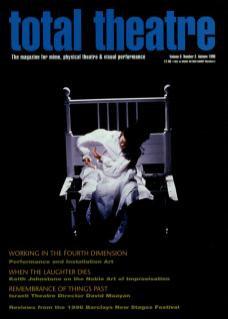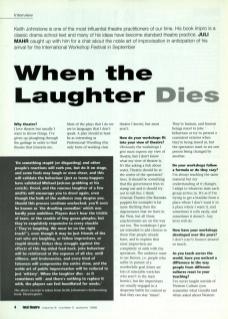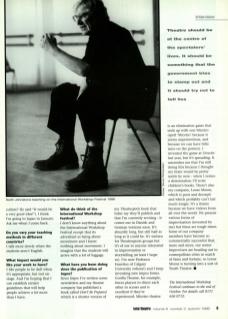Why theatre?
I love theatre but usually I want to throw things. I've given up ploughing through the garbage in order to find theatre that interests me.
Most of the plays that I do see are in languages that I don't speak. A play should at least be as interesting as Professional Wrestling (the only form of working class theatre I know), but most aren't.
How do your workshops fit into your view of theatre?
Obviously the workshops I give must express my view of theatre, but I don't know what my view of theatre is. It's like asking a fish about water. Theatre should be at the centre of the spectators' lives. It should be something that the government tries to stamp out and it should try not to tell lies. I think Oriental Theatre (the Bunraku puppets for example) is far more thrilling than the degeneracies that we have in the West, but all those anachronisms are on the way out too. The workshops I give are intended to add choices to those that people already have, and to explain that most improvisers are completely at odds with the spectators. The audience want to see Heroes, i.e. people who suffer in pursuit of a worthwhile goal (there are lots of miserable wretches who aren't in the least heroic), but the improvisers are usually engaged in a desperate battle for control so that they can stay 'intact'.
They're human, and human beings resort to joke behaviour or try to present a consistent exterior when they're being stared at, but the spectators want to see one person being changed by another.
‘Do something stupid (or disgusting) and other people's reactions will curb you, but do it on stage, and some fools may laugh or even cheer, and this will validate the behaviour (just as teeny-boppers have validated Michael Jackson grabbing at his crotch). Drool, and the raucous laughter of a few misfits will encourage you to drool again, even though the bulk of the audience may despise you. Should this process continue unchecked, you'll soon be known as 'the drooling comedian' which was hardly your ambition. Players don't hear the trickle of tears, or the crackle of tiny goose-pimples; but they're exquisitely responsive to every chuckle (‘They're laughing. We must be on the right track!’), even though it may be just friends of the cast who are laughing, or fellow improvisers, or stupid drunks. Unless they struggle against the effects of this lopsided feedback, joke behaviour will be reinforced at the expense of all else, until silliness, and irrelevancies, and every kind of falseness will compromise the entire show, and the noble art of public improvisation will be reduced to just 'wittery'. When the laughter dies – as it sometimes will – and there's nothing to replace it with, the players can feel humiliated for weeks.'
The above excerpt is taken from Keith Johnstone's forthcoming book Theatresports.
Do your workshops follow a formula or do they vary?
I'm always teaching the same material but my understanding of it changes. I adapt to whatever state each group arrives in. It's as if I'm trying to get a boulder from a place where I don't want it to a place where I want it, and sometimes it rolls easily, and sometimes it doesn't. Any lever will do.
How have your workshops developed over the years?
I don't (can't) bounce around so much.
As you teach across the world, have you noticed a difference in the way people from different cultures react to your teaching?
I've never taught outside of Western Culture (you remember what Gandhi said when asked about Western culture? He said ‘It would be a very good idea!’). I think I'm going to Japan in January. Ask me when I come back.
Do you vary your teaching methods in different countries?
I talk more slowly when the students aren't English.
What impact would you like your work to have?
I like people to be dull when it's appropriate, but not on stage. And I'm hoping that I can establish certain guidelines that will help people achieve a lot more than I have.
What do you think of the International Workshop Festival?
I don't know anything about the International Workshop Festival except that its advertised as being about movement and I know nothing about movement. I imagine that the students will arrive with a lot of luggage.
What have you been doing since the publication of Impro?
Since Impro I've written some newsletters and my theatre company has published a book called Don't Be Prepared which is a shorter version of my Theatresports book that Faber say they'll publish and that I'm currently revising – it comes out in Danish and German versions soon. It's absurdly long, but still half as long as it could be. It's written for Theatresports groups but it's of use to anyone interested in improvisation or storytelling (at least I hope so). I'm now Professor Emeritus of Calgary University (wheee!) and I keep inventing new impro forms. Gorilla Theatre, for example, forces players to direct each other in scenes and is excellent if they're experienced.
Micetro theatre is an elimination game that ends up with one Micetro (spelt 'Micetro' because it seems unpretentious, and because we can have little mice on the posters). I invented the game at Utrecht last year, but it's spreading. It astonishes me that I'm still doing this because I thought my brain would be pretty senile by now – when I notice a deterioration I'll write children's books. There's also my company, Loose Moose, which is poor and decrepit and which probably can't last much longer. It's a shame because we have visitors from all over the world. We present various forms of improvisation (invented by me) but these are tough times. Some of our company members have become so commercially successful that, more and more, our senior improvisers are heading out to cosmopolitan cities in search of fame and fortune, so Loose Moose is turning into a sort of Youth Theatre.
The International Workshop Festival continues to the end of October. For details call 0171 636 0712


